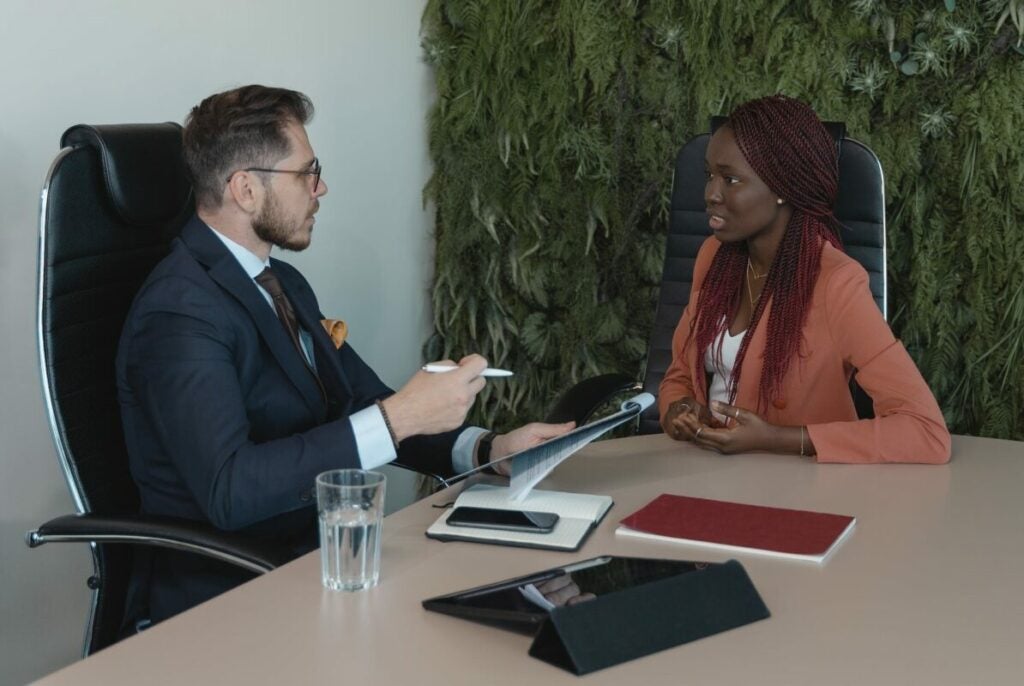Article
Ace Your Job Interview: Common Questions and How to Answer Them
Get your dream job easily with these tips

- November 8, 2023
- Updated: July 2, 2025 at 12:43 AM

Getting ready for a job interview isn’t always easy. You’ll be asked to talk about your experience, your qualifications, and prove yourself as a perfect fit for your dream position. Not to mention that sometimes, the impression you make on the interviewer and your social skills can outweigh your actual credentials. For those reasons, it’s common that job interviews become a nerve-wracking experience that even the most seasoned senior execs feel uneasy about.
Luckily, getting ready to ace your next job interview is easier than it looks. You’ll just need a positive mindset and follow these simple tips to navigate through those tricky questions with confidence and grace. These are the most common interview questions and how to answer them.

Complete guide to advancing your career
READ MORE1. Could you tell me about yourself in a brief?

Employers are always seeking candidates who fit in within the organization as a whole or the specific department they’ll be working with. This question is a way for them to see what a person can offer to the organization outside of the bullet points on a resume, so make sure to introduce yourself in an attractive way to create a long lasting impression on the interviewer.
“So, tell me about yourself.” is not an invitation to prattle on about your favorite hobbies, but to discuss relevant moments of your studies as well as personal achievements in previous job positions. Use the opportunity to also highlight partnerships you’ve formed, and discoveries you’ve made. It’s a chance to talk about how you’ve grown and added to your skillset. Think of it as an “elevator pitch,” where you have only a minute to sell yourself.
2. Why did you leave your previous job?

This one is tough because it’s bad form to blurt out something like, “I hate my coworkers” or “I need a higher salary to afford my new apartment.” Always turn this into a positive, even if that’s a bald-faced lie. Frame your answer in a way that focuses on your enthusiasm for taking on a new challenge, rather than attempting to get out of a miserable situation.
3. How did you hear about this position?

Companies like to know if you were actively looking for them or if this was one of many other jobs you decided to apply to. To succeed, make them know you sought the role yourself and explain what made you choose their company over other similar ones. If you got recommended for the position, tell the interviewer who told you about it and why he or she thinks you are perfect for the job. Last, but not least, be always enthusiastic about the position you’re applying to and mention it completely aligns with your future career plans.
4. What is your dream job?

Talk freely about your goals and ambitions, making sure to mention how this job and this specific company will help you get closer to them. You don’t necessarily need to say this is “The Job” you’ve always been dreaming of, but show yourself as a positive and enthusiastic person, eager to be part of the companies’ team
5. Why do you want to work with this company?

This can be a tricky question, so be careful when you answer it. To stand out over the other candidates you’ll have to evade generic answers that could work out for any other company or job position. To do so, simply research the business you’re applying to and write down everything that makes it unique. Once you have this list done, simply think of answers that will include each of these points. Make sure to add how much these appeal to you and how you can contribute in the future of the company.
6. What other companies are you interviewing with?

Companies often ask this question to know how serious you are about this position and, in the case you’re applying for other jobs, if they are relevant to this specific job. If you’re actually in another recruitment process, mention the one that has more in common with your current interview. And don’t forget to say how this specific role is the one you’re looking for.
7. What type of work environment are you looking for?

To answer your question you’ll need to research the background of the company you’re applying to. Learn about their work habits and make sure your reply is in harmony with the organization’s workplace culture. We recommend you to visit the companies’ website and take a few notes on their work ethics or look at what their employees say about their work experience there. Once you’ve done that, simply turn your notes into a few keywords you can add to your answers to express how your dream work environment matches the companies’ one.
8. Why should we hire you?

This is a bold question and that’s precisely why your interviewer chose it. Don’t let it take you by surprise! Simply elaborate an answer where you explain how you can not only do the work but also offer new ideas and deliver excellent results.
9. What makes you so unique?

This question is very similar to the previous one. Just think of a good reason for the company to pick you over the other candidates and elaborate a clear answer that is relevant to your job position. It’s always better to focus on a few things and explain them in detail than ramble about many without explaining them properly.
10. What do you think we could do better or different?

Here’s another question you have to be careful with since you can’t really talk badly about the company, but at the same time you can’t evade giving an elaborated answer about it. A good idea is to bring up something positive about the business and then add some constructive opinion about it, suggesting some changes or new points of view.
11. What are your greatest strengths?

Be prepared for this question because the odds are that it will appear in your job interview. To answer it like a pro, simply make a list of your best qualities and expand on them, explaining how they can help in the role you’re applying to. It’s a good idea to illustrate each and every single of your strengths with an example or a memory on how they helped in previous jobs. The less generic and more specific you are, the more you’ll make an impression on the interviewer.
12. What are your greatest weaknesses?

Okay, the tried and true response to this question is usually something cheesy like, “I care too much about my job.” “Sometimes, I’m too much of a perfectionist.” These responses will not get you far.
Still, the tactic of framing your weaknesses around your strengths is worth using. If you are a perfectionist, discuss how you care about doing the job right the first time, but you’ve been working on how to balance time management with a tendency to harp on the details.
You don’t want to mention a weakness that is too close to the job you’re applying for. Interpersonal skills like being too critical or public speaking might be good options, but only if they’re not part of the job description.
Finally, reflecting on positives is essential here. You might want to explain that even though you’re too sensitive sometimes, you’re an empathetic manager and a great team player — since you care how others feel. Or, you can talk about the actions you’ve taken to improve.
13. How do you deal with stressful situations?

This is one of the most important questions from your interview, so make sure to be prepared for it. All jobs are full of unexpected situations, intense deadlines and unforeseen events that will require your immediate attention. The interviewer wants to know if you’re a calm person that can deal with stress without suffering a meltdown or if, on the other hand, you’re prone to get stressed and burnt out easily. Your ability to stay positive, calm and focused are key to succeed.
A perfect way to reply to this question is, first of all, stating how methodical you are in your work and how you can easily deal with any kind of unexpected event by doing one thing at a time. Explain how the ability to remain calm under pressure is essential to finish any job in time and how you’ve dealt with stressful situations in the past without any kind of problem.
14. How do you keep yourself organized when working on multiple projects at a time?

Following the previous question, you’ll have to make sure to show yourself as an efficient and well organized person. Talk about your working habits and how you stay on track with your tasks, emphasizing how you always achieve your deadlines and how important they are for you. Give specific examples on hard or intense projects you’ve been working in and how you managed to deliver them in time.
15. Do you prefer to work on your own or on a team?

Whether you’re a teamwork enthusiast or a lone wolf that feels more comfortable working on your own, it’s important that you reply this question highlighting the advantages and disadvantages of both situations. Make sure to let the interviewer know how you can perfectly adapt to both working styles. Keep in mind that most companies work in teams or require collaborative work on a daily basis.
16. Tell me how you demonstrated your leadership skills in the past

Quick thinking and leadership skills are always a plus in every job position. Share with your interviewer one time where you took the initiative in a project and you managed to lead it to success by motivating the rest of the team. Make sure to give enough details to create an impression on human resources, but not so much that you start rambling.
17. How did you deal with a conflict in a previous job position?

If you’re applying for a job where you’ll be constantly working with a team, you’ll probably be asked about previous conflicts with co-workers and how you dealt with them. We know this is not a nice question but you’ll have to answer them with honesty, although try not to extend yourself too much. Just make sure to reply in a calm and professional way, spending more time explaining about the resolution of the conflict and everything you learnt from that situation.
18. How would your boss and coworkers describe you?

Honesty will be your best card on this one. Share with the hiring manager all the skills and personality traits you haven’t discussed yet. Remember if you make it to the final round of candidates, human resources might contact previous coworkers so always stick to the truth on this one.
19. What is your greatest professional achievement?

This is an easy one. Simply share with your interviewer an experience from your past jobs that you feel particularly proud about. Don’t be afraid to extend yourself and explain in detail what you did and how your actions lead to said achievement.
20. Have you ever disagreed with a decision from your superiors and how did you deal with it?

How you handle disagreements is something your interviewer will be very interested in. To come out of it with flying colors, start by making a short statement on what the disagreement was about and everything you learnt from it. Talk briefly on how important hunches can be and also, how you shared your thoughts with your superiors and how you learnt from their experience.
20. Tell me about a time you made a mistake at work

Honesty and learning from past mistakes are two of the most important values that a company is looking for in their employees. Don’t be afraid to share with the interviewer some of your past mistakes as long as you always explain how you learnt from them and strived to improve.
21. Tell me about a time you failed in a project

This question is very similar to the previous one, so it’s a good idea following the same type of answer. Simply think of a project you worked on in the past that didn’t go as expected and explain how you dealt with the situation. Don’t forget to mention that even if the outcome wasn’t good, that experience made you learn from it.
22. What do you do for fun?

This question is aimed at uncovering whether you’re a cultural fit for the job. This question is another basic one — but it tends to feel like a trick question. You’ll want to go for something more “wholesome” than “I love going through a six pack every night” or “you’ll catch me at the casino all weekend.”
Still, it sometimes feels like all people do is eat, drink, and watch things, changing locations and groups on occasion. Prepare some responses that highlight hobbies or skills you have — things like running half-marathons for fun, baking, photography, ceramics, and reading novels in your spare time are good responses, but there’s no right answer.
Just make sure you don’t answer this with one word. Being able to pass along your passion and enthusiasm is the real thing interviewers are looking for.
23. What are your salary expectations?

The reason this has become a staple interview question is employers often have a budget, they want to understand whether you know what you’re worth, and they want to see whether you’re applying for a job at the right professional level.
Career expert Liz Ryan recommends answering this question by deflecting. She says that job hunters should say something along the lines of, “I’m looking for a job in the range of $75,000, is this position within that range?”
The interviewer might answer, or not. They might also choose to circle back and ask again. If the hiring manager seems dead set on obtaining this information, it’s best just to be honest — unless it’s against the law to ask. If you have been underpaid in the past, make it clear that you believe this is the case and that you expect a significant increase in your next role. It’s not enough to say you’re underpaid; you’ll need to do your research. Sites like Glassdoor, Payscale, and the U.S. Bureau of Labor Statistics can help you identify average wages for your field, experience, and where you live — so be prepared with the numbers if you want to make your case.
24. Be prepared for Brain Teasers

Sometimes employers like to ask some challenging questions. This is a particularly common occurrence in IT companies. This piece from Career Sidekick looks at some of the most common brain teaser questions places like Facebook, Apple, and Google ask their prospective employees. Hint—there’s a lot of filling jugs, covering utility holes, and so on.
While you might not be able to prepare for the exact teaser at hand, there are some things you can do to be better prepared in the situation.
Bring paper and a pen/pencil to the interview — often, employers allow you to work through a problem on the spot. Bonus points for appearing prepared for anything.
Ask questions — If you’re unsure what the interviewer is asking, don’t hesitate to ask for clarification or more information. An interview is supposed to feel like a conversation, not a test. And while a brain teaser takes that dynamic and turns it on its head, it’s worth mentioning that you should feel comfortable asking questions.
Don’t worry about working through your answers out loud — Surprise, the answer is less important than A) your willingness to “play” the game and B) how you got there. Instead, the employer will look for creative brainstorming at play; they want to see how well you think on your feet, and how you might work through a difficult problem in a real-world scenario.
And if you’re stumped? If a brain teaser completely stumps you, it’s okay to fess up. Don’t get stressed out, instead, ask if you can come back to the question a bit later.
25. Where do you see yourself in five years?

Human resources ask this question for several reasons: They want to know your career expectations, if you’re an ambitious person and if you aim to be loyal to the company and stay there for years or if you’re planning to seek other positions. Think carefully about what you want to reply and try to be honest with your life goals, although make sure to mention that this job will play an important role in your life.
26. When can you start?

The best way to answer this question is being realistic about your current situation. If you’re unemployed, you can offer to start within a week, giving the business time to prepare themselves for your incorporation. If you currently have a job though, make sure to be honest and let them know you still need to notify your previous job that you’re leaving. As usual, honesty will be your best strategy.
27. Are you willing to relocate?

This is a complicated question since not everybody is willing to move for a job position. If you’re open to it, state openly you’re willing to do so to be part of the company. However, if you’re not happy with the idea, we recommend you to not say no. Instead of that, share your enthusiasm for the position and let them know that at this precise moment, it’d be hard for you to take such a big step. It’s also a good idea to bring alternatives to relocate, such as working remotely with the rest of the team.

How to prepare for a FaceTime job interview
READ MOREFinal thoughts
Overall, preparation is your best bet for nailing a job interview and succeeding in getting your dream job. Take as much time as needed to do your research and make sure to figure out what your goals and experience can bring to the company. From there, tailor your responses so they all show your interviewer how you intend to make their lives easier — even when the questions sound like they’re supposed to be about you.
As a final suggestion, once you’ve finished the interview, make sure you send a thank you note. Not only is it good manners, but it also helps to make sure the interviewer remembers you when it comes time to make a decision. Good luck!
Mireia Fernández is passionate about the world of video games and new technologies, a hobby that dates back to her childhood with the MSX HB 501p. Born and residing in Barcelona, Mireia has been working as an editor for over 10 years and specializes in writing reviews, tutorials, and software guides, as well as doing everything possible to publish news before anyone else. Her hobbies include spending hours playing on her console, walking her golden retriever, and keeping up with the latest SEO developments.
Latest from Mireia Fernández
- A Greener Web and Cleaner Oceans: Why So Many Are Switching to Wave Browser
- Fuel Your Instagram Feed: How Adobe Stock’s Infinite Library Powers Your Creativity
- Agentic AI in Adobe Express: Will Conversational Editing Change 2026 Content Creation?
- Gmail Help Me Write with Gemini: 7 Ready-to-Use Prompts for Complaints, Sales & Internal Memos
You may also like
 News
NewsThe iPhone Fold has leaked: These could be Apple’s foldable specs
Read more
 News
News2026 Cybersecurity Predictions: Navigating a New Era of Sophisticated Scams
Read more
 News
NewsProduct photography on a tight budget: images for e-commerce with Photoshop + Firefly
Read more
 News
NewsDisco Elysium has so much text that the text software couldn't contain it
Read more
 News
NewsThe pirates return to the big screen in this new movie that will remind you of Pirates of the Caribbean
Read more
 News
NewsThe former CEO of Activision Blizzard is delighted to see how poorly Call of Duty is doing
Read more